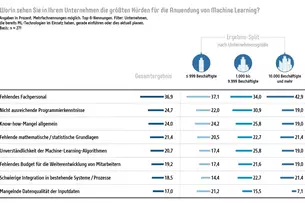Machine learning is becoming standard
For companies, machine learning and artificial intelligence are key technologies and drivers of growth. And those who shy away from investments in this area are in danger of falling behind.
Authorities and the public health system did not exactly cover themselves with “digital” glory during the coronavirus pandemic. Faxes and paper documents sometimes caused costly, if not health-endangering, delays. It’s a good thing that at least German companies are increasingly relying on digitalization. And machine learning (ML) and artificial intelligence (AI) play a central role here. After all, according to the IDG study “Machine Learning 2021,” almost two thirds of the companies surveyed use machine learning or are currently developing appropriate solutions.
This applies to almost three quarters of the large companies (those with more than 10,000 employees) and to over half of the smaller companies. 20% of the participants in the study even significantly increased their spending on ML during the pandemic.
Lower costs, higher productivity
And it doesn’t take long to see successful results. Around two thirds of the companies were able to enjoy measurable added value after three months at the most. The three most important criteria for this were increases in productivity and efficiency, and reductions in cost. Factors like a higher degree of innovation or new products and services generated with AI and ML, meanwhile, ranked lower. The latter, however, applies to small and medium-sized companies in particular. For around 40% of large companies, an increase in the power to innovate is of great importance.
For example, a study by ZEW Mannheim on behalf of the Federal Ministry for Economic Affairs and Energy (BMWi) shows that, through the use of AI, German companies achieved sales of 7.6 billion euros with world market innovations as early as 2018.
For medium-sized companies, the strategic potential of AI and ML ranks well behind short-term benefits such as cost reductions through the optimization and automation of internal processes. The administration of complex IT and cloud environments or protection against rampant cyber-attacks can hardly be done by hand. And according to the IDG study, quality assurance in production (54%), research and development (54% each) and logistics (53%) increasingly rely on “intelligent” technologies.
Wanted: AI and ML experts
However, problems arise due to the lack of data scientists and data engineers. This was recently reported in the “ISG Provider Lens Analytics—Solutions and Service Partners Report Germany 2020.” After all, only the specialists are able to define use cases and design them in such a way that the desired added value occurs and serves as a suitable basis for fact-based decisions at the management level.
The IDG study reaches a similar result. 37% of companies have problems finding AI and machine learning experts. This affects large companies in particular, which is why they are increasingly training their own employees. However, while the executive level has recognized the potential, IT and specialist departments continue to view AI with skepticism. A third of the executives surveyed stated that they are still struggling with acceptance problems on the part of the workforce.

